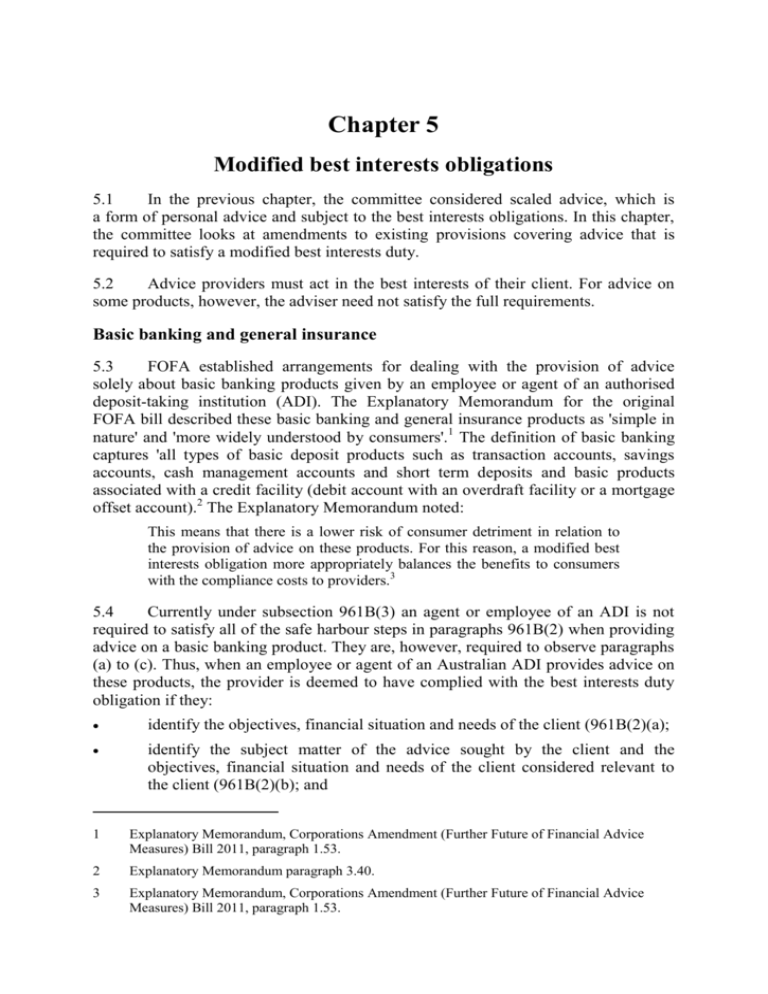PDF 109KB
advertisement

Chapter 5 Modified best interests obligations 5.1 In the previous chapter, the committee considered scaled advice, which is a form of personal advice and subject to the best interests obligations. In this chapter, the committee looks at amendments to existing provisions covering advice that is required to satisfy a modified best interests duty. 5.2 Advice providers must act in the best interests of their client. For advice on some products, however, the adviser need not satisfy the full requirements. Basic banking and general insurance 5.3 FOFA established arrangements for dealing with the provision of advice solely about basic banking products given by an employee or agent of an authorised deposit-taking institution (ADI). The Explanatory Memorandum for the original FOFA bill described these basic banking and general insurance products as 'simple in nature' and 'more widely understood by consumers'.1 The definition of basic banking captures 'all types of basic deposit products such as transaction accounts, savings accounts, cash management accounts and short term deposits and basic products associated with a credit facility (debit account with an overdraft facility or a mortgage offset account).2 The Explanatory Memorandum noted: This means that there is a lower risk of consumer detriment in relation to the provision of advice on these products. For this reason, a modified best interests obligation more appropriately balances the benefits to consumers with the compliance costs to providers.3 5.4 Currently under subsection 961B(3) an agent or employee of an ADI is not required to satisfy all of the safe harbour steps in paragraphs 961B(2) when providing advice on a basic banking product. They are, however, required to observe paragraphs (a) to (c). Thus, when an employee or agent of an Australian ADI provides advice on these products, the provider is deemed to have complied with the best interests duty obligation if they: identify the objectives, financial situation and needs of the client (961B(2)(a); identify the subject matter of the advice sought by the client and the objectives, financial situation and needs of the client considered relevant to the client (961B(2)(b); and 1 Explanatory Memorandum, Corporations Amendment (Further Future of Financial Advice Measures) Bill 2011, paragraph 1.53. 2 Explanatory Memorandum paragraph 3.40. 3 Explanatory Memorandum, Corporations Amendment (Further Future of Financial Advice Measures) Bill 2011, paragraph 1.53. Page 52 where reasonably apparent that information relating to the client's relevant circumstances was incomplete or inaccurate, make reasonable enquires to obtain complete and accurate information (961B(2)(c).4 5.5 The proposed changes to subsection 961B(2), already discussed, regarding paragraphs (a) to (c) will affect the modified best interests duty only in so far as paragraphs (b), (ba) and (c) will now apply. 5.6 In addition, ASIC advises that to satisfy the modified best interests duty the provider: must comply with the appropriate advice requirement; must comply with the obligation to warn the client if advice is based on incomplete or inaccurate information; and does not need to comply with the requirement to prioritise the client’s interests.5 5.7 Subsection 961B(4) provides further that the same obligations apply to a general insurance product.6 Currently, a modified form of the best interests duty applies when advice is provided: on a basic banking product only, and the advice provider is an agent or employee of an Australian authorised deposit-taking institution (ADI), or otherwise acting by arrangement with an Australian ADI under the name of the Australian ADI; on a general insurance product only; a basic banking product, a general insurance product or a combination of those products, where the advice provider is an agent or employee of an Australian ADI, or otherwise acting by arrangement with an Australian ADI under the name of an Australian ADI; or general insurance and other products.7 5.8 According to the Explanatory Memorandum, the proposed legislation makes consequential amendments to the modified best interests duty as a result of the inclusion of consumer credit insurance products in section 963D. This change is in accordance with the government’s commitment to include consumer credit insurance products in this section of the Corporations Act. 4 Explanatory Memorandum, Corporations Amendment (Further Future of Financial Advice Measures) Bill 2011, paragraph 1.50. 5 ASIC, Regulation Impact Statement, Future of Financial Advice: Best interests duty and related obligations, December 2012, p. 7. 6 Explanatory Memorandum, paragraph 1.49. 7 Explanatory Memorandum, Corporations Amendment (Further Future of Financial Advice Measures) Bill 2011, paragraph 1.52. Page 53 5.9 The bill repeals subsections 961B(3) and (4) and inserts new subsections that would change the current arrangement and broaden the existing basic banking products to include all simple 'Tier 2' products.8 Tier 2 products include basic banking products, general insurance products and consumer credit insurance. 5.10 The Explanatory Memorandum makes clear that this amendment: …does not extend the modified best interests duty…to the provision of consumer credit insurance; rather, it allows the modified best interests duty to apply to a basic banking product and/or general insurance product where the subject matter of the advice sought also relates to consumer credit insurance.9 5.11 Section 961J requires an advice provider to give priority to the interests of the client in situations where the provider knows, or reasonably ought to know, there is a conflict between the interests of the client and the interests of the advice provider. Under subsections 961J(2) and (3) providers of advice about basic banking products or general insurance are excluded from the obligation to give priority to the interests of the client.10 As noted earlier, basic banking products and general insurance are recognised as being simple in nature and are understood widely by consumers. 5.12 Proposed changes to subsections 961J(2) and (3) would allow an agent or employee to prioritise their own or their employer's interests ahead of the client's for the sale of basic banking products, general insurance, CCI or any combination of those products.11 5.13 The bill amends these exemptions from the client priority obligation to align them with the amendments to the modified best interests duty that stem from the inclusion of consumer credit insurance in the basic banking exemption. 12 Thus, as outlined in the Explanatory Memorandum: An agent or employee of an ADI will be exempt from the client priority obligation in relation to advice that relates to a basic banking product or a general insurance product, or a combination of these products, if the subject matter of the advice sought by the client relates only to a basic banking product, a general insurance product, a consumer credit insurance product, or a combination of any of these products. The client priority rule will continue to apply to advice provided in relation to a consumer credit insurance product.13 8 Regulation Impact Statement, p. 87. 9 Explanatory Memorandum, paragraph 1.54. 10 Explanatory Memorandum, Corporations Amendment (Further Future of Financial Advice Measures) Bill 2011, paragraph 1.63 and Explanatory Memorandum, paragraph 1.58. 11 Submission 7, p. 9. 12 Explanatory Memorandum, paragraph 1.56. 13 Explanatory Memorandum, paragraph 1.60. Page 54 Opposition to changes to modified best interests obligations 5.14 CHOICE maintained that a reduced best interests obligation is inappropriate for any type of personal advice. It was particularly concerned about changes to CCI, referring to numerous studies that had shown persistent and significant mis-selling.14 CHOICE recommended no change to the best interests obligation or to scoping of advice. 5.15 Referring to the proposed changes to section 961J, Ms Erin Turner, CHOICE, stated that it: …clearly allows situations where when giving advice on basic banking, general insurance and consumer credit insurance alongside of that agents or employees can prioritise their own or, particularly worrying, their employer's interests ahead of a client's. 5.16 She suggested further that, while there was reference to these products being simple to understand, most consumers would not agree. She argued that: Even with basic banking products, we find that people have a lot of difficulty understanding not just the short-term but particularly the longterm impacts of taking on a product. With issues of financial literacy, this is very concerning.15 5.17 AIST stated that it did not believe that 'a case has been made as to why any financial products should be exempt from the client priority obligation or the full requirements of the best interest obligations'.16 It stated further: In addition, we fail to understand why individual advisers should receive preferential treatment based upon their happenstance of employment with an ADI. 17 5.18 In its opinion, this provision continued 'to legalise bad advice with respect to these products' and AIST could not support this measure. Furthermore, it believed that to legislate this measure could 'only act to reduce the reputation of financial advisers'.18 Support for changes to modified best interests obligations 5.19 The Customer Owned Banking Association (COBA) was of the view that the modified best interests duty, which applies to advice given by banking staff about basic banking products and general insurance products, should also apply to advice on 14 Submission 7, p. 9. 15 Proof Committee Hansard, 22 May 2014, p. 18. 16 Submission 22, p. 8. 17 Submission 22, p. 9. 18 Submission 22, p. 9. Page 55 consumer credit insurance (CCI).19 It noted that, in its current form, the bill makes banking staff giving personal advice about basic banking products and general insurance products (Tier 2) subject to the modified best interests duty only, even if they also give personal advice about CCI. However, personal advice about CCI itself continues to be subject to the full best interests duty.20 5.20 COBA wanted the extension of the modified best interests duty to include CCI. In its view, CCI was 'a relatively straightforward product designed to protect consumers in times of difficulty'. Thus, it argued that bringing 'the best interests duty requirements for advice about CCI into line with those for other Tier 2 products would reduce red tape and ensure consistent regulatory treatment for similar products.21 5.21 Ms Diane Tate, Australian Bankers' Association, referred to the basic banking exemptions implemented by the former government that do not work properly and result in a very product-delineated process for retail banks.22 She cited several amendments considered by the previous government which were to make sure that existing exemptions for basic banking products—deposits, non-cash payment facilities, travellers cheques, general insurance products and consumer credit insurance actually worked in a practical sense. These existing exemptions carve out basic banking products from the full best-interests duty, so that the modified best interests duty would apply, as well as the conflicted remuneration provisions.23 Ms Tate explained that the banks were not seeking an expansion of those exemptions but rather to have them work seamlessly.24 She gave the following example: …a customer walks into a bank at the moment—and this is a really common scenario—and expresses an interest in a home loan product. A bank teller or a bank specialist can give them some information around that and advice around the types of home loans that are available. The customer then is likely to say, 'I need to make repayments on this home loan; what is the best way to do that?' So then they will start talking about a transaction account, which is a deposit account under the law, and then they might say, 'You know, a good way to minimise your repayments is to have a mortgage offset account.' So suddenly we are now talking about a credit facility and a deposit product. The next thing is that the customer might say, 'Look, I'm concerned about making these repayments. Are there some products that I can have from a risk management perspective?' That is consumer credit insurance. So now you are having a conversation about that. Then the bank teller may say, 19 Submission 12, p. 2. 20 Submission 12, p. 2. 21 Submission 12, p. 2. 22 Proof Committee Hansard, 22 May 2014, p. 75. 23 Proof Committee Hansard, 22 May 2014, p. 75. 24 Proof Committee Hansard, 22 May 2014, pp. 75–76. Page 56 'Look, it's also really important to make sure that you have your property insured as well.'25 5.22 Ms Tate explained that after 1 July 2014, this seamless set of arrangements could not operate unless the relevant provision in the bill is enacted. Conclusion 5.23 The committee understands that the current best interests duty impose a modified best interests duty for certain advice providers who provide advice on basic banking products or general insurance products. The amendments to the modified best interests duty are consequential changes stemming from the government’s commitment to include consumer credit insurance products in section 963D of the Corporations Act. 5.24 As a consequence of the amendments to the modified best interests duty that flow on from the inclusion of consumer credit insurance in the basic banking exemption, changes to the client priority obligation exemptions were also required. 25 Proof Committee Hansard, 22 May 2014, p. 76.








